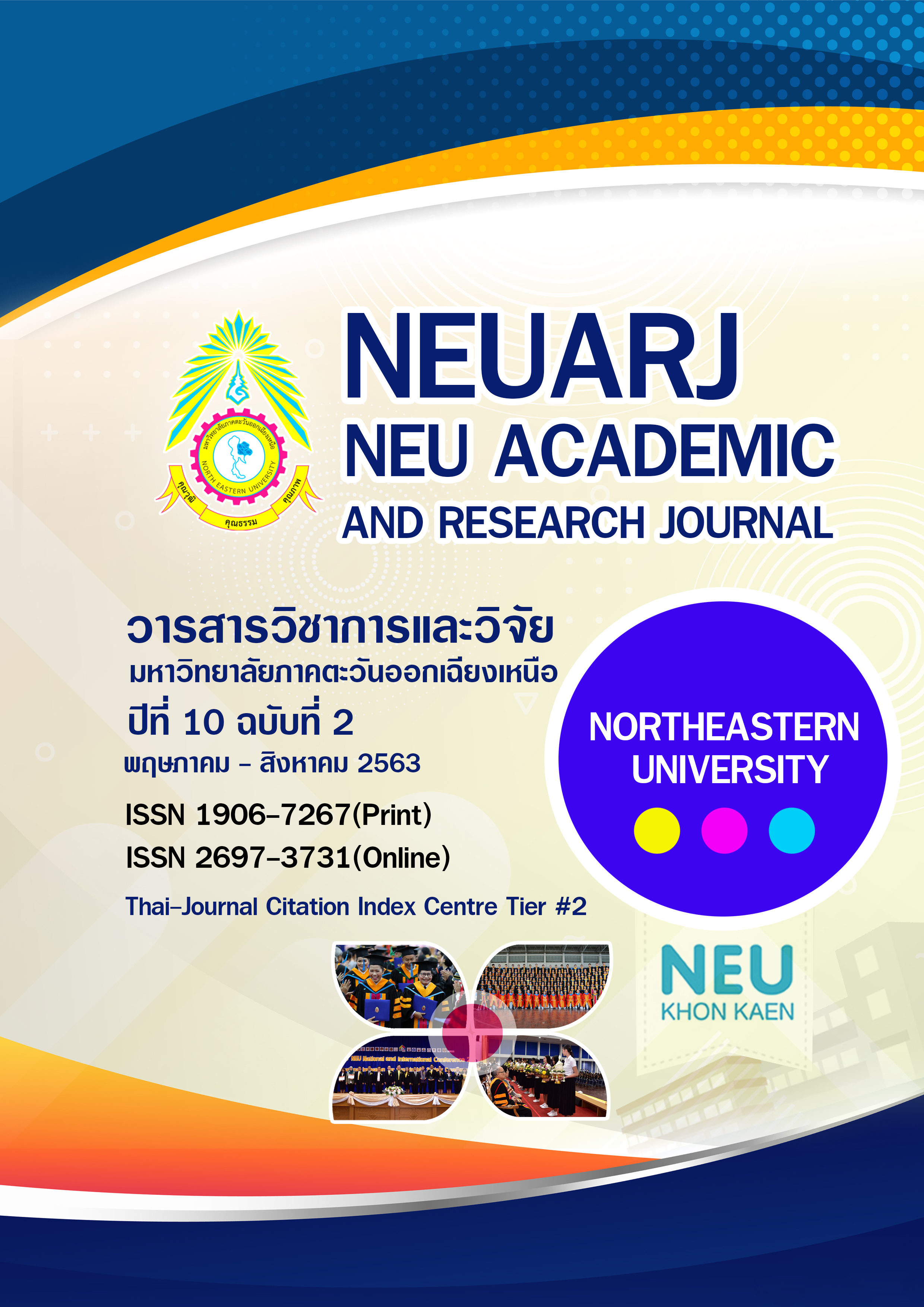รูปแบบการพัฒนาครูในการใช้เทคโนโลยีสารสนเทศและการสื่อสารเพื่อการจัดการเรียนรู้ ในโรงเรียนประถมศึกษา สังกัดสำนักงานศึกษาธิการภาค 11
คำสำคัญ:
การพัฒนาครู, เทคโนโลยีสารสนเทศและการสื่อสาร (ICT), หนังสืออิเล็กทรอนิกส์บทคัดย่อ
การวิจัยครั้งนี้ มีวัตถุประสงค์เพื่อ 1) ศึกษาองค์ประกอบของการใช้ ICT เพื่อการจัดการเรียนรู้ในโรงเรียนประถมศึกษา สังกัดสำนักงานศึกษาธิการภาค 11 2) ออกแบบและพัฒนารูปแบบการพัฒนาครูในการใช้ ICT เพื่อการจัดการเรียนรู้ในโรงเรียนประถมศึกษา สังกัดสำนักงานศึกษาธิการภาค 11 3) ศึกษาผลการใช้รูปแบบการพัฒนาครูในการใช้ ICT เพื่อการจัดการเรียนรู้ในโรงเรียนประถมศึกษา สังกัดสำนักงานศึกษาธิการภาค 11 ซึ่งแบ่งการวิจัยออกเป็น 3 ระยะ คือ ระยะที่ 1 การศึกษาองค์ประกอบและรูปแบบการพัฒนาครูในการใช้ ICT เพื่อการจัดการเรียนรู้ ประกอบด้วย การวิเคราะห์เอกสารและงานวิจัยที่เกี่ยวข้องการสัมภาษณ์เชิงลึก ตรวจสอบและประเมินความเหมาะสมโดยผู้เชี่ยวชาญ และการวิจัยเชิงสำรวจสอบถามระดับการปฏิบัติของครูในการใช้ ICT เพื่อการจัดการเรียนรู้ ประชากร ได้แก่ ครูผู้สอนในโรงเรียนประถมศึกษาสังกัดสำนักงานศึกษาธิการภาค 11 จำนวน 14,950 คน กลุ่มตัวอย่างในการศึกษาเชิงสำรวจ จำนวน 375 คน ใช้แบบสอบถามแบบมาตราส่วนประมาณค่า 5 ระดับ วิเคราะห์ข้อมูล โดยใช้ค่าความถี่ ร้อยละ ค่าเฉลี่ย ส่วนเบี่ยงเบนมาตรฐาน และวิเคราะห์ความต้องการจำเป็น ระยะที่ 2 การสร้าง การตรวจสอบและประเมินความเหมาะสมของรูปแบบ ระยะที่ 3 การทดลองใช้รูปแบบกับครูผู้สอนระดับประถมศึกษา จำนวน 30 คน ผลการวิจัย พบว่า
1. องค์ประกอบการพัฒนาครู มี 5 องค์ประกอบ คือ ทักษะพื้นฐานด้าน ICT ทักษะการใช้ ICT ในการติดต่อสื่อสาร ทักษะการรู้ทัน ICT ทักษะการบูรณาการ ICT ในการเรียนการสอน และคุณธรรม จรรยาบรรณการใช้ ICT
2. รูปแบบการพัฒนาครูในการใช้ ICT เพื่อการจัดการเรียนรู้ คือ EAIT Model ประกอบด้วย การเริ่มต้น การประยุกต์ การแพร่กระจาย และปรับโฉมใหม่
3. ผลการใช้รูปแบบในภาพรวมและรายด้านอยู่ในระดับมาก เครื่องมือที่ใช้ในการพัฒนา คือหนังสืออิเล็กทรอนิกส์ (e-Book) มีประสิทธิภาพ 81.20/87.14 ตามเกณฑ์มาตรฐาน 80/80 และคะแนนหลังเรียนสูงกว่าคะแนนก่อนเรียนอย่างมีนัยสำคัญทางสถิติที่ระดับ .01
เอกสารอ้างอิง
กระทรวงเทคโนโลยีสารสนเทศและการสื่อสาร. (2554). กรอบนโยบายเทคโนโลยีสารสนเทศและการสื่อสาร ระยะ พ.ศ. 2554-2563 ของประเทศไทย (ICT 2020). กรุงเทพฯ: ศูนย์เทคโนโลยีสารสนเทศและการสื่อสาร.
กระทรวงเทคโนโลยีสารสนเทศและการสื่อสาร. (2559). แผนพัฒนาดิจิทัลเพื่อเศรษฐกิจและสังคม DIGITAL THAILAND. กรุงเทพฯ: ศูนย์เทคโนโลยีสารสนเทศและการสื่อสาร.
กระทรวงศึกษาธิการ. (2556). แผนพัฒนาการศึกษาของกระทรวงศึกษาธิการ ฉบับที่สิบเอ็ด พ.ศ. 2555– 2559. กรุงเทพฯ: สำนักงานปลัดกระทรวงศึกษาธิการ.
กิตติศักดิ์ โสตาภา. (2558). สภาพปัญหาและความต้องการการใช้เทคในโลยีสารสนเทศ ในการบริหารสถานศึกษาในจังหวัดนครพนม. (วิทยานิพนธ์ปริญญาครุศาสตรมหาบัณฑิต, มหาวิทยาลัยนครพนม).
จิตติมา อัครธิติพงศ์. (2556). การพัฒนาทรัพยากรมนุษย์ Human Resource Development. พระนครศรีอยุธยา: มหาวิทยาลัยราชภัฏพระนครศรีอยุธยา.
จิราภรณ์ พรหมทอง. (2559). การพัฒนาตนเองให้เป็นบุคคลแห่งการเรียนรู้เพื่อเข้าสู่ศตวรรษที่ 21 Self Development to be a Learning Person in the 21st Century. วารสารวิชาการมหาวิทยาลัยฟาร์อีสเทอร์น, 10(2), 63-72.
นันทภัค จันทร์สาห์. (2561). ข้อเสนอเชิงนโยบายเพื่อการพัฒนาครูให้มีสมรรถนะตามมาตรฐานวิชาชีพที่สอดคล้องกับการจัดการเรียนรู้ในศตวรรษที่ 21 สำนักงานเขตพื้นที่การศึกษาประถมศึกษาพะเยาเขต 1. (วิทยานิพนธ์ปริญญาครุศาสตรดุษฎีบัณฑิต, มหาวิทยาลัยราชภัฎเชียงราย).
ปาริชาติ เภสัชซา. (2558). การพัฒนาสมรรถนะครูผู้นำด้านการใช้เทคโนโลยีสารสนเทศและการสื่อสารในการจัดกิจกรรมการเรียนรู้ศตวรรษที่ 21. วารสารบัณฑิตศึกษา มหาวิทยาลัยราชภัฏสกลนคร, 12(59), 95-104.
พงษ์ ผาวิจิตร. (2555). กึ๋นแห่งศตวรรษใหม่ : 21st Certury Skills. กรุงเทพฯ: เอ็ดวานซ์ อินเตอร์ พริ้นติ้ง.
พิรดา มาลาม. (2560). การพัฒนารูปแบบการบริหารจัดการเทคโนโลยีสารสนเทศและการสื่อสารโรงเรียนสังกัดสำนักงานเขตพื้นที่การศึกษามัธยม เขต 24. (วิทยานิพนธ์ปริญญาปรัชญาดุษฎีบัณฑิต, มหาวิทยาลัยราชภัฏมหาสารคาม).
มหาวิทยาลัยศรีนครินทรวิโรฒ. (2557). โครงการบริการวิชาการเพื่อการพัฒนาสมรรถนะด้าน ICT ครั้งที่ 15. กรุงเทพฯ: สำนักคอมพิวเตอร์ มหาวิทยาลัยศรีนครินทรวิโรฒ.
วารุณี คงวิมล. (2561). การพัฒนาหนังสืออิเล็กทรอนิกส์ (e-Book) เรื่อง การใช้โปรแกรม Photoshop เพื่อผลิตสื่อการสอนสำหรับครูระดับประถมศึกษา. (วิทยานิพนธ์ปริญญาครุศาสตรมหาบัณฑิต, มหาวิทยาลัยบูรพา).
วาสนา สีลาภเกื้อ. (2555). สมรรถนะด้านเทคโนโลยีสารสนเทศและการสื่อสารที่จำเป็น ของบุคลากรสำหรับการทำงานในมหาวิทยาลัย: กรณีศึกษาบุคลากรสายสนับสนุนของมหาวิทยาลัยสงขลานครินทร์. (วิทยานิพนธ์ปริญญาวิทยาศาสตรมหาบัณฑิต, มหาวิทยาลัยสงขลานครินทร์).
วิจารณ์ พานิช. (2555). วิถีสร้างการเรียนรู้เพื่อศิษย์ในศตวรรษที่ 21. กรุงเทพฯ: มูลนิธิสดศรีสฤษดิ์วงศ์.
วิชัย วงษ์ใหญ่ และ มารุต พัฒผล. (2562). Digital Learning. กรุงเทพฯ: ศูนย์ผู้นำนวัตกรรม หลักสูตรและการเรียนรู้.
วีรวิชญ์ เลิศรัตน์ธำรุงกุล. (2561). เสรีภาพในการแสดงความคิดเห็นตามรัฐธรรมนูญบนเครือข่ายสังคมออนไลน์ภายใต้การบังคับใช้พระราชบัญญัติว่าด้วยการกระทําความผิดเกี่ยวกับคอมพิวเตอร์ฉบับที่ 2 พ.ศ. 2560. วารสารวิชาการและวิจัยมหาวิทยาลัยภาคตะวันออกเฉียงเหนือ. 8(2). 26-41.
ศิวพร ศรีมังคละ. (2561). สมรรถนะด้านการใช้เทคโนโลยีสารสนเทศและการสื่อสารพื้นฐานของครู สังกัดสำนักงานเขตพื้นที่การศึกษาประถมศึกษาสกลนคร เขต 3. (วิทยานิพนธ์ปริญญาวิทยาศาสตรมหาบัณฑิต, มหาวิทยาลัยราชภัฏสกลนคร).
สำนักงานคณะกรรมการพัฒนาการเศรษฐกิจและสังคมแห่งชาติ. (2559). แผนพัฒนาเศรษฐกิจและสังคมแห่งชาติฉบับที่ 12 (พ.ศ. 2560 -2564). กรุงเทพฯ: สำนักนายกรัฐมนตรี.
สำนักงานเลขาธิการสภาผู้แทนราษฎร. (2559). ประเทศไทย 4.0. สืบค้นเมื่อ 21 เมษายน 2560, จาก https://library2.parliament.go.th/ejournal/content_af/2559/jul2559-5.pdf
สุทธิพร จิตต์มิตรภาพ. (2553). การเปลี่ยนแปลงโลกของการเรียนรู้ในศตวรรษที่ 21 และการพัฒนาสู่ “ครูมืออาชีพ”. ข่าวสารวิชาการ, มีนาคม 2556, 1-5.
สุวิมล ว่องวาณิช. (2558). การวิจัยประเมินความต้องการจำเป็น. กรุงเทพฯ: สำนักพิมพ์ แห่งจุฬาลงกรณ์มหาวิทยาลัย.
อาจณรงค์ มโนสุทธิฤทธิ และคณะ (2560). รูปแบบการพัฒนาครูมัธยมศึกษาให้มีความสามารถด้านการออกแบบบทเรียน STEM Education โดยการศึกษาบทเรียนและเครือข่ายสังคมออนไลน์. (รายงานการวิจัยฉบับสมบูรณ์, มหาวิทยาลัยบูรพา).
อุบลรัตน์ หริณวรรณ. (2559). การเสริมสร้างสมรรถนะครูด้านเทคโนโลยีสารสนเทศทางการศึกษาโดยใช้การเรียนรู้แบบแลกเปลี่ยนเรียนรู้. (วิทยานิพนธ์ปริญญาดุษฎีบัณฑิต, มหาวิทยาลัยเทคโนโลยีพระจอมเกล้าพระนครเหนือ).
อุบลวรรณ ลิ้มสกุล. (2561). การพัฒนาระบบฝึกอบรมภควันตภาพเพื่อพัฒนาสมรรถนะเทคโนโลยีสารสนเทศและการสื่อสาร สำหรับนิสิตคณะศึกษาศาสตร์มหาวิทยาลัยบูรพา. (ดุษฎีนิพนธ์ปริญญาดุษฎีบัณฑิต, มหาวิทยาลัยบูรพา).
Dade, C. (2010). Edited by James Bellanca & Ron Brandt. Comparing frameworks for 21st century skills. 21st century skills: Rethinking how students learn. Bloomington. IN: Solution Tree Press. 51-76.
Dessler, Gary. (2009). Human Resource Management. Upper Saddle River, New Jersey: Prentice - Hall.
Islam, A.K.M. Najmul. (2016). E-learning system use and its outcomes : Moderating role of perceived compatibility. Telematics And Informatics. Science Direct, 33, 48-55.
Jame Bellanca and Ron Brandt. (2010). 21st century skills : rethinking how students learn. United State of America: Solution Three Press.
Jonathan Anderson. (2010). ICT TRANSFORMING EDUCATION A Regional Guide. Thailand: UNESCO Bangkok.
Partnership for 21st Century Skills. (2003). Learning for the 21stCentury : A Report and Mile Guide for 21st Century Skills. Retrieved August 10, 2015, from http://www. 21st centuryskills.org.
Hong Kong Education City (2005). Chief executive's award for teaching excellence teachers association (ATETA) and The Hong Kong association for computer education (HKACE). Retrieved October 22, 2009, from http://www.hkedcity.net/article/ec-hot-post/23apr10/.
International Society for Technology in Education (ISTE). (2007). Preparing Teachers to Use Technology. U.S Department of Education’s Preparig : PBS Teacher Line.
Maryland State Department of Education. (2002). Maryland Teacher Technology Standards. Maryland: Office of the Deputy State Superintendent for Finance and Administration.
UNESCO. (2008). ICT Competency Standards for Teachers. United Kingdom: United Nations Educational, Scientific and Cultural Organization.
UNESCO. (2011). ICT Competency Framework for Teachers. The United Nations Educational, Scientific and Cultural Organization 7, place de Fontenoy, 75352 PARIS 07 SP.



